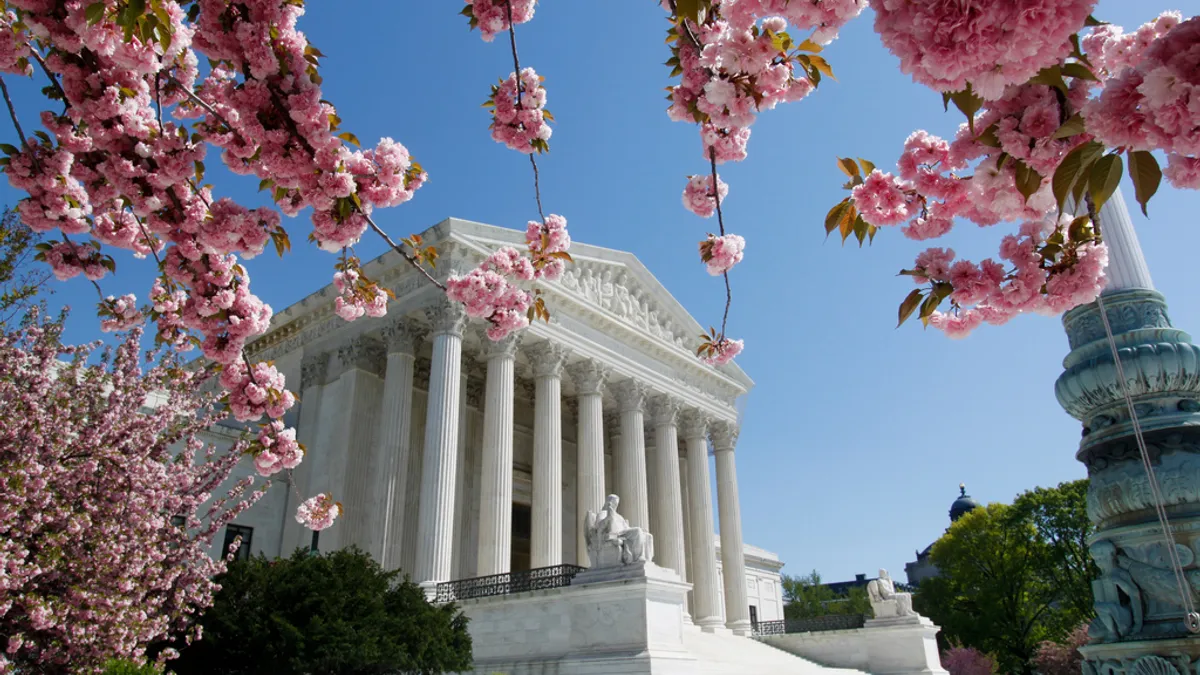Dive Brief:
- The U.S. Supreme Court on Monday declined to take up a pair of cases challenging state nuclear subsidies in New York and Illinois, affirming the legality of the similar programs.
- Fossil fuel generators had challenged the legality of the subsidies, which were respectively upheld by federal district and appeals courts last year. The Supreme Court announced it would not hear the cases without explanation.
- The decision helps define the extent of state jurisdiction in setting power generation policy. The High Court previously said it was illegal to link receipt of a state subsidy to participation in interstate power markets, but the nuclear subsidy programs do not make participation mandatory.
Dive Insight:
The Supreme Court's decision not to hear challenges to the nuclear subsidies is the final ruling on the legality of the programs, whose structure has now been replicated in other states.
Since New York and Illinois approved their nuclear supports in 2016 and 2017, respectively, Connecticut and New Jersey have enacted programs to preserve the generators threatened with early retirement because of competition from natural gas and renewables.
With each program, policymakers designed the subsidies to skirt an earlier Supreme Court ruling — 2016's Hughes v. Talen Energy.
In that case, the Supreme Court invalidated a gas generation program in Maryland because the state made receipt of a subsidy contingent on the plant participating in the PJM wholesale market, which operates across more than a dozen mid-Atlantic states.
That, the High Court unanimously ruled, amounted to a state policy interfering in the interstate power markets overseen by the Federal Energy Regulatory Commission, rendering the subsidy program unconstitutional.
The Illinois and New York subsidies, however, avoided the issue by linking their subsidies to the carbon-free generation nuclear power provides, and making participation in wholesale markets only voluntary for the plants.
Writing in support of the subsidies, FERC and the Department of Justice told a lower court this year that the Zero Emission Credit (ZEC) programs avoid the "fatal defect" of the Hughes case because market participation is not required.
"Generators may receive ZECs even if they do not clear the capacity auctions conducted by the two FERC-jurisdictional market operators in Illinois," they wrote. "The ZECs are separate commodities that represent the environmental attributes of a particular form of power generation; they are not payments for, or otherwise bundled with, sales of energy or capacity at wholesale, and thereby fall outside of FERC's exclusive jurisdiction over wholesale transactions."
The 7th Circuit Court of Appeals, which received that brief, sided with FERC and the nuclear sector in its Sept. 2018 ruling upholding the Illinois subsidies.
Judge Frank Easterbrook invoked the Hughes case explicitly in his decision, writing that it "draws a line between state laws whose effect depends on a utility's participation in an interstate auction (forbidden) and state laws that do not so depend but that may affect auctions (allowed)."
The 2nd Circuit Court of Appeals followed suit weeks later, issuing a similar decision upholding New York's ZEC program.
"New York has kept the line in sight, and gone as near as can be without crossing," wrote Judge Dennis Jacobs.
The Supreme Court's decision to abide by those rulings shows it is interpreting the Hughes decision narrowly, allowing states to set energy goals that do not directly influence power markets even if there are indirect and expected impacts on prices.
Now that the ZEC policies have been upheld, other states could use them as models to craft programs. Pennsylvania and Ohio lawmakers are currently considering nuclear subsidies, but a draft version of the Ohio bill would require subsidy recipients to be compensated "exclusively" by wholesale markets, potentially making it legally vulnerable.
While the nuclear subsidies have been upheld, FERC can still take action to limit their wholesale market impacts. Regulators are currently considering rule changes in PJM that would remove subsidized resources from its capacity market, but have been unable to form a majority to approve or deny them for months.













